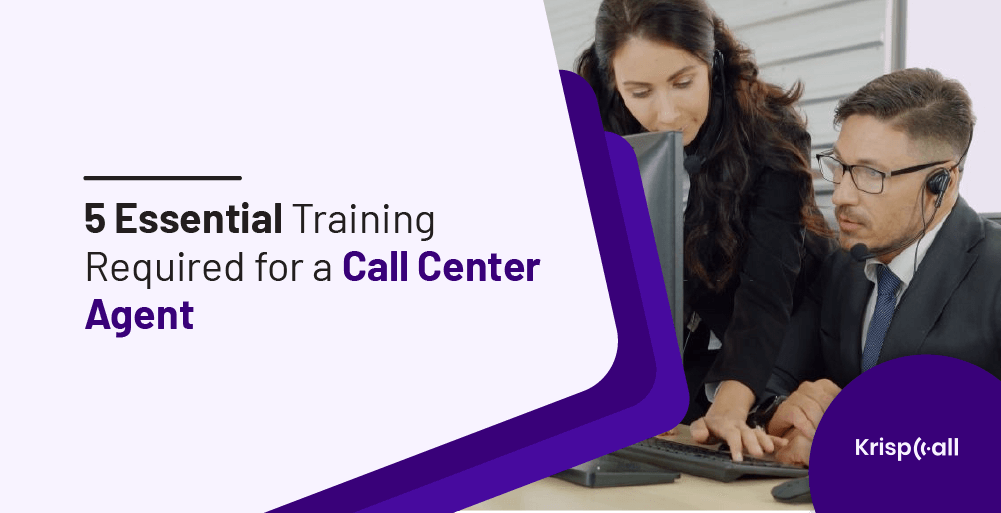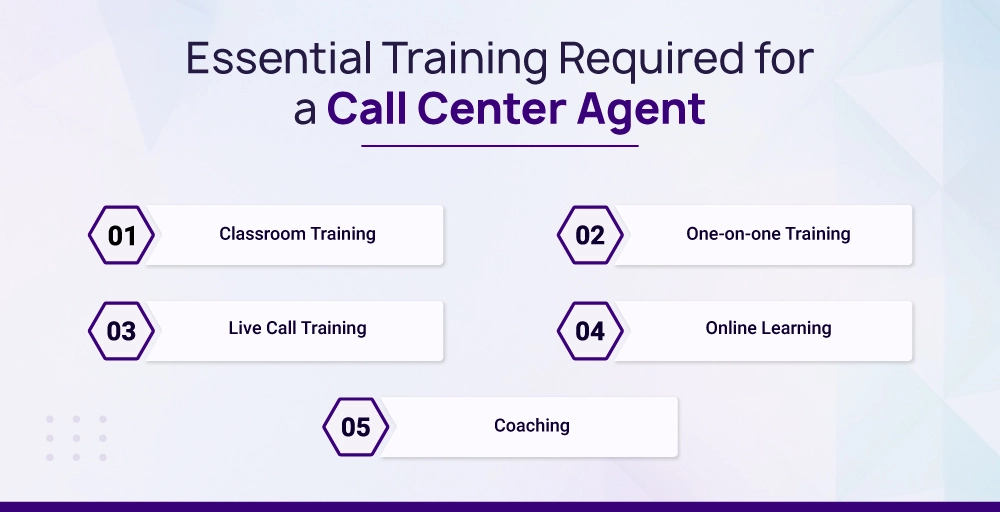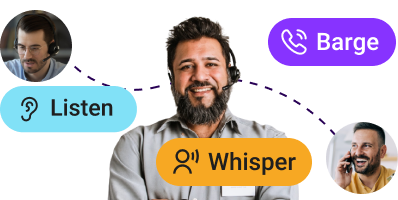5 Essential Training Required for a Call Center Agent
-
Last Updated: 16 Feb 24
-
14 min read

For instance, you are a customer, and you bought products from a company. After some time, you had difficulties using that product, so you contacted the call center agent for solutions.
But the agent at the call center was no help at all, he didn’t respond to you on time and didn’t provide enough information to solve your problem. It would disappoint you, right? 😔
In this competitive world, to be a successful organization, you should stand out from others. For the same reason, investing in call center agent training programs is a must.
The call center should not be limited to just picking up calls 📳. It should also help to solve customer issues quickly and effectively.
In this post, you will discuss all the essential call center agent training required for a call center that makes him capable of handling customer calls and addressing their issues tactfully.
What is Call Center Agent Training?
Call center agent training means the course, sessions, seminars, or coaching that teaches skills and behavior to the call center agents on how to interact with the customers. These skills are very important because they will directly affect the business.

You may think it is a one-time session, but NO. It will take different sessions or seminars that cover different skills needed for a successful call center.
In addition, speaking and solving the customer’s problem is important, but agents should also learn about soft skills like empathy and active listening to the customer’s problems.
Get Phone Numbers for Your Virtual Call Center Easily.
Get super-affordable phone numbers from all over the world for your virtual call centers quickly and conveniently.
Select numbers :
5 Essential Call Center Agent Training Required in a Call Center
Be it in the case of customer support or a cold calling campaign, the role of call center agents is important. And to improve the efficiency of the workflow, it’s crucial to run call center agent coaching programs time and again.
Here are some essential training and coaching call center agents need to improve the efficiency of a call center.

1. Classroom Training
Most of the training is given outside the classroom, but this formal training has its place. Classroom training doesn’t mean everyone sitting in rows and listening to the teacher; instead, it may include different group activities and other workshops.
In contrast, this type of training can be helpful as all the members are present and everyone will know each other.
2. One-on-one Training
This type of training can be very difficult to attend for someone but is very effective. Managers can sit down with the new employees and talk about their strengths and weaknesses.
Also, talking about the experience and effective training plans will help a new employee significantly.
3. Live Call Training
The most fundamental training at the call center that managers or call center trainers should give to the agents is live call training. In this type of training, theoretical knowledge will come into practice, and it will teach agents to handle customers’ calls under pressure.
So, live call training is the initial training given to every call center agent as it will massively improve their phone manners and skills.
4. Online Learning
You can find different call center training software on online where you can learn about many courses and interact with them. Some business provides online training for call center agents who want to grasp knowledge while living across different cities or countries.
But this may not be as effective as other forms of training because of its less engagement. Also, different online software are available in the market at different pricing and various features.
5. Coaching
With the proper guidance, there will always be room for improvement. But if the relationship between the teacher and student is not good, then coaching will not be effective and will be no fun at all, which will disadvantage both parties.
In the same way, the trainers can also set up in-house mentoring software to guide the new call center agents. Also, some software allows trainers to jump into the call where they can guide the agent without the customer knowing.
Essential Skills Required for a Call Center Agent
So now you know all the basic formats of call center training required for remote call center agents. Now let’s dive into the essential skills required to be a successful call center agent.
1. Problem-solving skills
Whether your agent is a salesperson or technical support, the finest skill they should have is problem-solving skills or finding solutions to every problem they may face.
- A sales or marketing agent should be able to know:
- What product the customer has and what problem they are facing,
- What can solve their problem, and
- Should be able to convince to buy the product or at least evaluate the product the company wants to sell.
Similarly, a technical support agent should be able to:
- Address the problem that customers might face after buying your product
- They must also know how to deal with consumers who make unreasonable requests and how to handle tense situations.
Whether a sales agent or technical support agent, they must have complete knowledge of the business’s products or services to handle every customer problem.
2. Communication skills
The agent should be a skilled communicator. But that does not mean only speaking, but also active listening as the customer will hesitate to repeat the problem repeatedly.
Moreover, the agent should be able to answer any inquiries effectively and with full confidence.
3. Organizational Skills
A call center agent will have to deal with multiple customer calls daily. And, keeping up with each customer’s detail can be difficult, and pressure can be daunting.
So, an agent should manage all the customer’s issues, requests, complaints, and know-how to organize. Also, the agent should be able to get the best out of the resources to address the issues.
4. Speed
Customers will always prefer the call center, which can solve their issues quickly. When an agent drags the call for a long time, the customer will get impatient, losing interest in the product and not buying the product.
Moreover, it is not about one customer. If the agent spends too much time with a customer, other customers will be on hold, leaving them impatient and losing interest in the products. So the speed of the call agent also reflects the growth of the business, especially the online business.
5. Empathy
A call center agent should always have one thing in mind: the customer is always right. Yes, some customers might have difficult inquiries and demands that might be beyond the company’s reach, but an agent should handle them very well.
In addition, an agent should be compassionate enough to calm down the angry customer and guide them to solve the problems successfully. Even when the customers are wrong, an agent should explain to them in a way that they feel they are right.
10 Tips & tricks for call center agents to perform well while working remotely
Despite organizing all the essential call center agent training, it does not guarantee you an efficient workflow from the agents. That’s because learning is one thing and performing is another.
So here are a few tips and tricks for call center agents that’ll help them succeed while working in a remote call center environment.
1. Accept ongoing training
The most successful contact centers are abandoning one-size-fits-all, point-in-time training programs. Traditional one-time, classroom-style call center training, delivered to all new agents over one or more days, falls short because most of us forget what we’ve learned over time.
Agents must keep up with new tools and change customer behaviors and preferences. As a result, it’s critical to keep reinforcing training within the context of your contact center and products or services.
Agents can learn better and retain more from training courses when training programs are fluid and include online training and self-learning opportunities. Eventually, your call center will reach its full potential.
2. Create goals and objectives
An organization’s goals and objectives must align with its business strategy for a call center training program to be successful.
To craft agent training content, an organization must develop and document its vision, mission goals, objectives, culture, and brand goals on a strategic level.
3. Encourage and motivate your agents
Customers will notice a lack of enthusiasm in your agents’ voices if they are not motivated to do their jobs. Customers will be unimpressed if an agent does not seem enthusiastic about the product they are selling.
Customers are more likely to be convinced by agents who have been trained and are motivated to do their job. Customer service representatives do more than sell a product or service; they also market its image by using their personality.
4. Cloud Solution
Today’s cloud solutions enable organizations to be agile and flexible and respond quickly to extraordinary situations. Telephony, a hot channel for customer experience, should not be overlooked. Today’s IP telephony solutions enable you to provide the mobility required by all of your company’s employees, including your agents’ training programs.

Working remotely does not significantly impact your processes as long as you have the necessary remote working tools. You and your employees can be fully operational in a matter of minutes by integrating a 100 percent cloud-based call management solution with your business tools.
5. Make a Learning and Development Plan
Learning and development should be about increasing productivity; it should also help with employability. You must ensure that your employees can do their jobs and know the necessity to invest in their future and your company’s future.
To develop a learning and development strategy, you must first examine your business and its values in depth. Determine and recognize which employee capabilities are most important to your success, and then collaborate with your department to develop the tools, training, and programs required to realize your vision.
6. Determine the phases of training
A successful call center training program must include time-bound phases and some stages that repeat.
i. New employee training
This phase is limited in duration and is typically managed at the corporate level. It includes any paperwork and corporate policy training that HR may specify; depending on the center and the agent’s time to proficiency, new hire training can last two to eight months. In this phase, call center managers can incorporate a variety of resources and training channels.
ii. Training through supervising and nesting training
This stage is usually included in new hire training. After learning a skill, new employees can shadow one or more management team members throughout the phase as needed.
Nesting training is a formal process in which new agents work in a practice setting with trainers, managers, and other staff to assist them in learning on the job. It can last between two and four weeks. Before they work on the floor, agents spend time here learning.
iii. Revision training
After management teams notice performance deficiencies, this phase is repeated and focuses on retraining agents.
The goal is to retrain agents on previously learned skills and performance requirements. Management teams should also ensure that agents understand any organizational process changes.
7. Meetings with Individuals
It is challenging to train new agents in an isolated environment if communication is not prioritized. Face-to-face video calls are instrumental in this regard. Videoconferencing is an effective way to improve remote team members’ connectivity.
Even better, you can record the call during a video session so the new agent can review it later for clarity or additional coaching.
8. Implement Remote Training Tools
So, what remote training tools do you require to be successful?
Remote call center training necessitates a high level of interaction and collaboration. This necessitates remote collaboration tools that enable instant, responsive, and flexible cooperation.
- Slack – Slack provides instant messaging, notifications, file sharing, group chats, and a user-friendly interface.
- Google Drive – Google Drive is an excellent choice for essential document collaboration.
- Zoom – Zoom is a robust video conferencing tool that allows quick and easy chats.
- Timetracko – Helps to keep track of your employees and productivity.
9. Recognize and reward achievement
Success can be rewarded when the organization outlines the preceding steps with criteria. Employees can be recognized based on training hours, highest scores on quizzes, tests, certifications, professional development credits, quality and coaching levels attained, projects completed, customer testimonials, and internal group testimonials.

To keep employees engaged, managers should keep recognition consistent each week and change the rewards and criteria.
10. Make Your Remote Agents Trustworthy
Trust is essential for remote call center agents to be successful. People will deliver better quality if they feel trusted.
When working remotely, you can’t keep an eye on everyone and everything, and you can’t prepare for every scenario an agent might face. However, if you can trust your agents to optimize their work, learn from their mistakes, and keep moving forward.
The key is to develop a solid work-from-home strategy and model tailored to your organization’s mindset and culture. Then you must take a step back and trust your employees to follow the rules you’ve established.
You can build trust with your remote agents by doing the following:
- Communicate with your agents regularly to feel like they are part of a team.
- Motivate and empower your agents to accept responsibility for their work. While it is essential to encourage agents to follow procedures, the best agents can think for themselves and think outside the box rather than simply following the process.
- Engage with your agents by hosting regular virtual events, such as virtual drinks. When you work with your agents, you create a community and a culture that provides comfort and safety.
- Request feedback from your agents on their remote training experience. This will make them feel important and keep them engaged in the process.
To Sum Up
A call center agent’s job is tough. Handling many calls, listening to their problems, and replying with correct answers every day can be very difficult. So proper training and guidance should be given to every agent so that they can organize their work properly and work efficiently.
Software like Krispcall can come in handy to give proper training, sessions, or video conferences, where all the agents and trainers can be invited to the same room.
Krispcall provides a unified callbox feature where all the agents and the manager can join. Also, Krispcall comes with other features like shared workspace, do not disturb feature, member-to-member communication, live call training, etc.
Krispcall provides all of these capabilities at a low cost. If you want to learn more about KrispCall, you can schedule a demo or subscribe to one of the subscription plans, if you want to start using.



